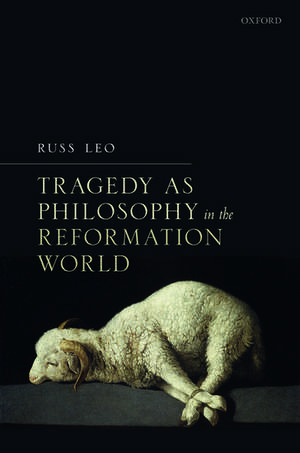Tragedy as Philosophy in the Reformation World
Autor Russ Leoen Limba Engleză Hardback – 29 ian 2019
Preț: 546.98 lei
Preț vechi: 740.55 lei
-26% Nou
Puncte Express: 820
Preț estimativ în valută:
104.67€ • 109.50$ • 86.95£
104.67€ • 109.50$ • 86.95£
Carte tipărită la comandă
Livrare economică 22-28 martie
Preluare comenzi: 021 569.72.76
Specificații
ISBN-13: 9780198834212
ISBN-10: 0198834217
Pagini: 312
Dimensiuni: 162 x 243 x 23 mm
Greutate: 0.59 kg
Editura: OUP OXFORD
Colecția OUP Oxford
Locul publicării:Oxford, United Kingdom
ISBN-10: 0198834217
Pagini: 312
Dimensiuni: 162 x 243 x 23 mm
Greutate: 0.59 kg
Editura: OUP OXFORD
Colecția OUP Oxford
Locul publicării:Oxford, United Kingdom
Recenzii
Leo's TPRW offers a selection of insightful analyses that could interest a range of scholars in different fields, including reception history of the Bible and of Aristotle, historical theology, history of philosophy, history of the Protestant Reformation, literary criticism, and hermeneutics, and it may even help a tragedian or two. There is so much of value here.
Russ Leo's Tragedy as Philosophy in the Reformation World is an impressive, and humbling, work of meticulous scholarship.
In exploring the history of the second possibility, Leo shows us how early modern scholars and playwrights tried to get a glimpse of things not as they seem to be, but as they actually are.
Russ Leo's Tragedy as Philosophy in the Reformation World is an impressive, and humbling, work of meticulous scholarship.
In exploring the history of the second possibility, Leo shows us how early modern scholars and playwrights tried to get a glimpse of things not as they seem to be, but as they actually are.
Notă biografică
Russ Leo is an Assistant Professor in the English Department at Princeton University. After receiving his PhD from the Program in Literature at Duke University he held a Perkins-Cotsen Postdoctoral Fellowship in the Society of Fellows at Princeton University. His articles have appeared in such academic journals as SEL: Studies in English Literature 1500-1900, Comparative Literature, Milton Studies, and the Journal of Medieval and Early Modern Studies as well as in edited collections such as The Oxford Handbook of the Early Modern Bible (edited by Kevin Kileen, Helen Smith, and Rachel Willie; OUP, 2015) and The Young Spinoza (edited by Yitzhak Y. Melamed; OUP, 2015). He is an editor (with Katrin Röder and Freya Sierhuis) of The Measure of the Mind: Fulke Greville and the Literary Culture of the English Renaissance (OUP, forthcoming).
